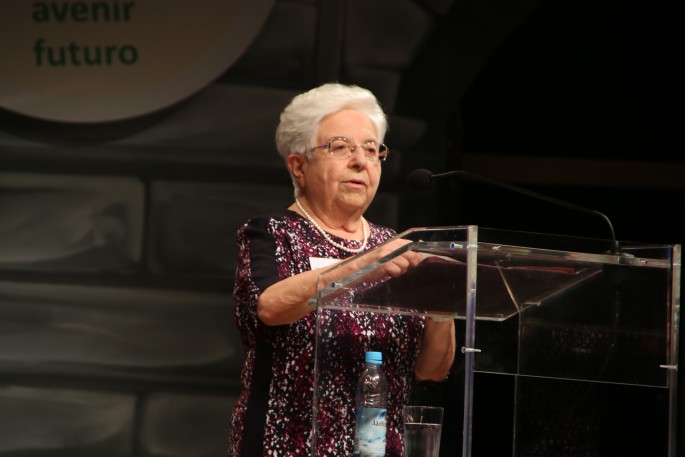
Jul 1, 2016 | Focolare Worldwide
 «It is paradoxical that the new Europe, which arose out of the demolition of the Berlin Wall, should be tempted, through fear, to shut itself behind new fences, building new walls and fences, in the illusion of being able to stop history that is once again knocking at its doors. The single currency project was supposed to be a big new step towards political union, a great new identifying moment in which solidarity and the sharing of sovereignty, in order to achieve common objectives, were to represent the fundamental pillars. Actually two examples show us how little this has been achieved. On the one hand, the serious delays and heated debates that followed the Greek debt crisis, which greatly undermined the foundations of solidarity among the member states, even leading to speculation on Greece leaving the Euro. On the other hand there is the Brexit issue and other separatist tendencies which also test solidarity severely. Because going out of the Union is not like leaving a club, but is equivalent to, and much more like, abandoning partners with whom we no longer share the same reason for being together: the founding pact. Europe is going through the dark night of its own principles, the dark night of its dreams. In reality, a great sense of disorientation reigns in our continent because of the presence of three simultaneous crises: an unprecedented migratory crisis, together with a deep economic crisis, against the backdrop of a demographic crisis. While leaving it to others to analyse the reasons for these crises, I believe that the deeper causes of Europe’s weakness today can be found in the denial of God and of the transcendent. This is a result of the gradual emergence and spread of secular culture which wants to do away with any link with the supernatural. In the search for total freedom, Europe no longer recognizes that its culture was formed through 2,000 years of Christian tradition. Denying this means cutting its own roots and finding itself like a lifeless tree. So is everything collapsing then? Is the continent’s dream of unity being shattered? No. We are here together, as Christian movements and communities in Europe, because we believe there is something that does not collapse. It is love; God who is Love. Our movements are bearers of charisms which are certainly very different from each other and yet all are the work of the Holy Spirit. But the Holy Spirit is precisely the one who creates fraternity (so to speak) among the Persons of the Trinity and who unites all Christians. So the idea of fraternity originates in Heaven and is the purpose of life on earth. All of us can bear witness that we met Christ one day and let ourselves be fascinated and drawn into his Gospel. Living his words led us to change ourselves and reach out to others, building relationships of gospel love and thereby creating communities that become leaven wherever they are. We have discovered a new willingness to be open to all, crossing the boundaries between Churches, between religions, between ethnicities and cultures, in a 360-degree dialogue, until we rediscover everyone as our brothers and sisters. In this way we have found the root of our European culture once more and, on this foundation, we have tried to interpret our present times, which concern the entire planet and all humankind as never before, from the perspective of moving towards a united world. In fact, applying the ideals of peace, justice, freedom and equality today means having a universal dimension, which fraternity makes possible (read the full text)».
«It is paradoxical that the new Europe, which arose out of the demolition of the Berlin Wall, should be tempted, through fear, to shut itself behind new fences, building new walls and fences, in the illusion of being able to stop history that is once again knocking at its doors. The single currency project was supposed to be a big new step towards political union, a great new identifying moment in which solidarity and the sharing of sovereignty, in order to achieve common objectives, were to represent the fundamental pillars. Actually two examples show us how little this has been achieved. On the one hand, the serious delays and heated debates that followed the Greek debt crisis, which greatly undermined the foundations of solidarity among the member states, even leading to speculation on Greece leaving the Euro. On the other hand there is the Brexit issue and other separatist tendencies which also test solidarity severely. Because going out of the Union is not like leaving a club, but is equivalent to, and much more like, abandoning partners with whom we no longer share the same reason for being together: the founding pact. Europe is going through the dark night of its own principles, the dark night of its dreams. In reality, a great sense of disorientation reigns in our continent because of the presence of three simultaneous crises: an unprecedented migratory crisis, together with a deep economic crisis, against the backdrop of a demographic crisis. While leaving it to others to analyse the reasons for these crises, I believe that the deeper causes of Europe’s weakness today can be found in the denial of God and of the transcendent. This is a result of the gradual emergence and spread of secular culture which wants to do away with any link with the supernatural. In the search for total freedom, Europe no longer recognizes that its culture was formed through 2,000 years of Christian tradition. Denying this means cutting its own roots and finding itself like a lifeless tree. So is everything collapsing then? Is the continent’s dream of unity being shattered? No. We are here together, as Christian movements and communities in Europe, because we believe there is something that does not collapse. It is love; God who is Love. Our movements are bearers of charisms which are certainly very different from each other and yet all are the work of the Holy Spirit. But the Holy Spirit is precisely the one who creates fraternity (so to speak) among the Persons of the Trinity and who unites all Christians. So the idea of fraternity originates in Heaven and is the purpose of life on earth. All of us can bear witness that we met Christ one day and let ourselves be fascinated and drawn into his Gospel. Living his words led us to change ourselves and reach out to others, building relationships of gospel love and thereby creating communities that become leaven wherever they are. We have discovered a new willingness to be open to all, crossing the boundaries between Churches, between religions, between ethnicities and cultures, in a 360-degree dialogue, until we rediscover everyone as our brothers and sisters. In this way we have found the root of our European culture once more and, on this foundation, we have tried to interpret our present times, which concern the entire planet and all humankind as never before, from the perspective of moving towards a united world. In fact, applying the ideals of peace, justice, freedom and equality today means having a universal dimension, which fraternity makes possible (read the full text)».
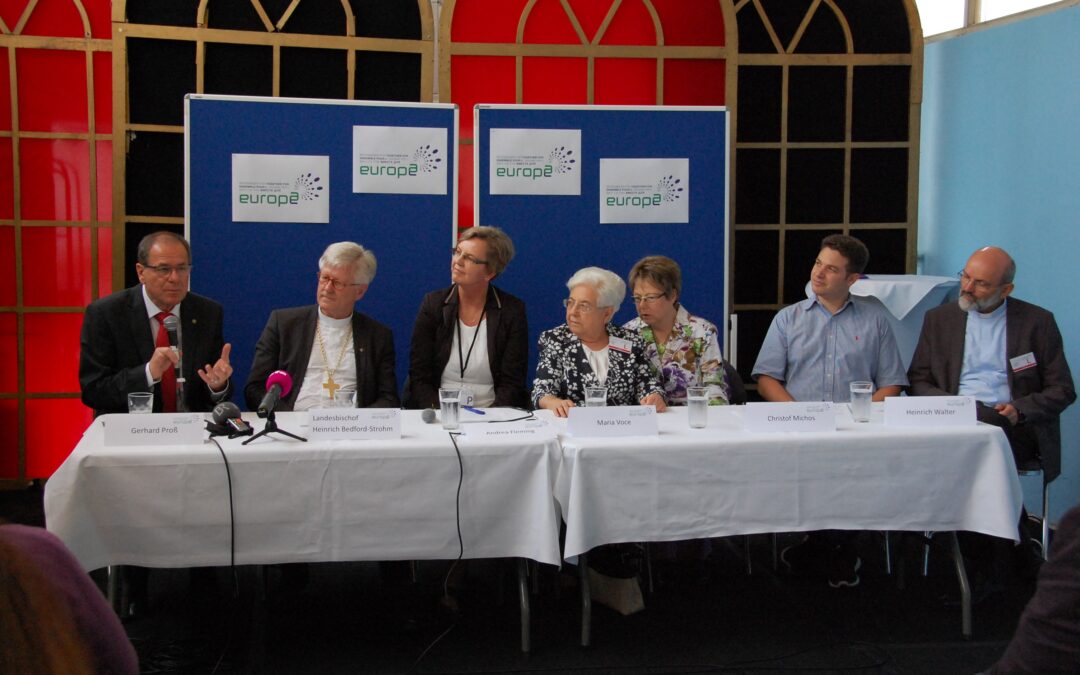
Jul 1, 2016 | Focolare Worldwide
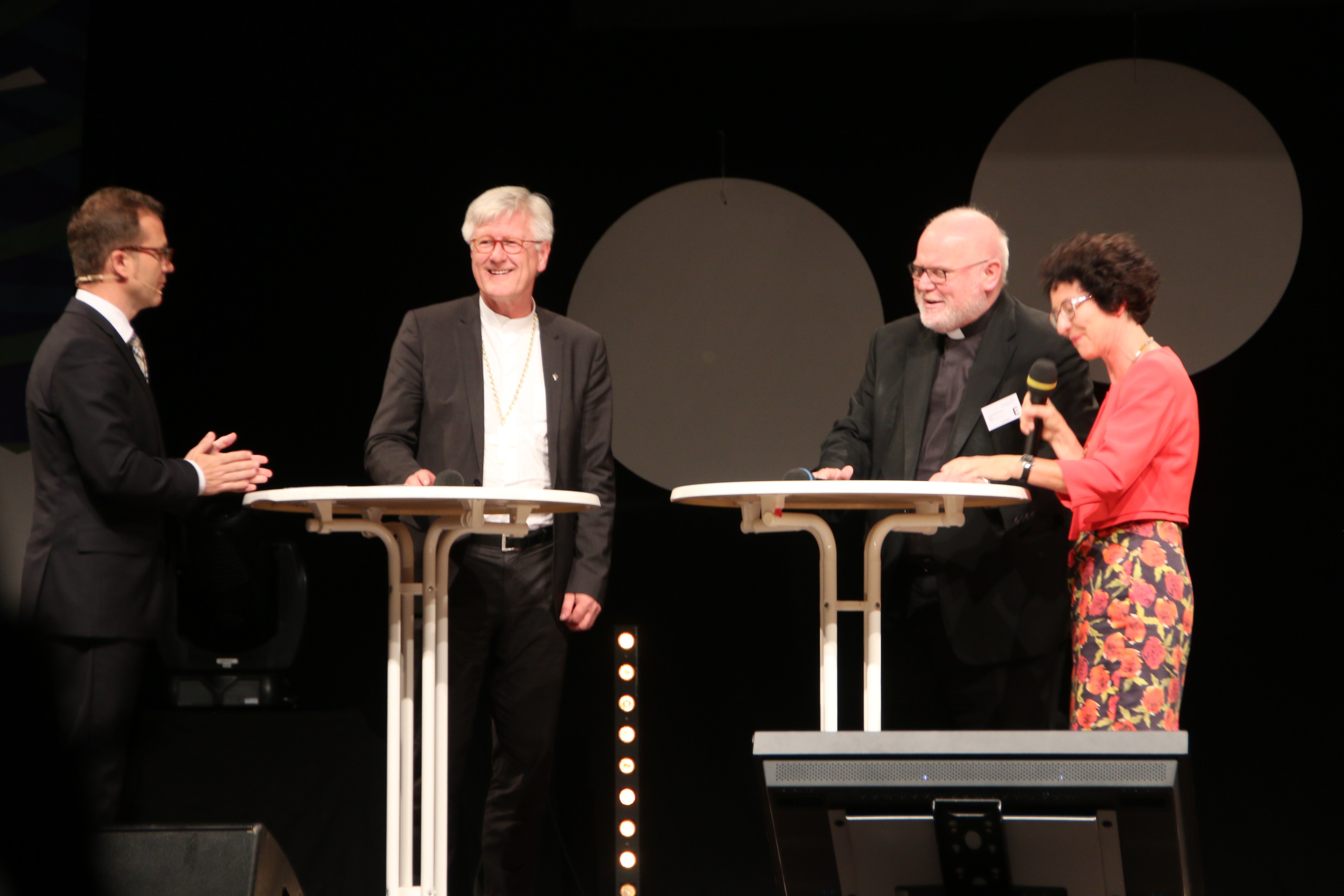
Martin Wagner, CVJM München and Gabriele Deutschmann, CVJM Esslingen interview evangelical-lutheran bishop Heinrich Bedford-Strohm, and Card.Reinhard Marx (C) T4E, Foto: Haaf
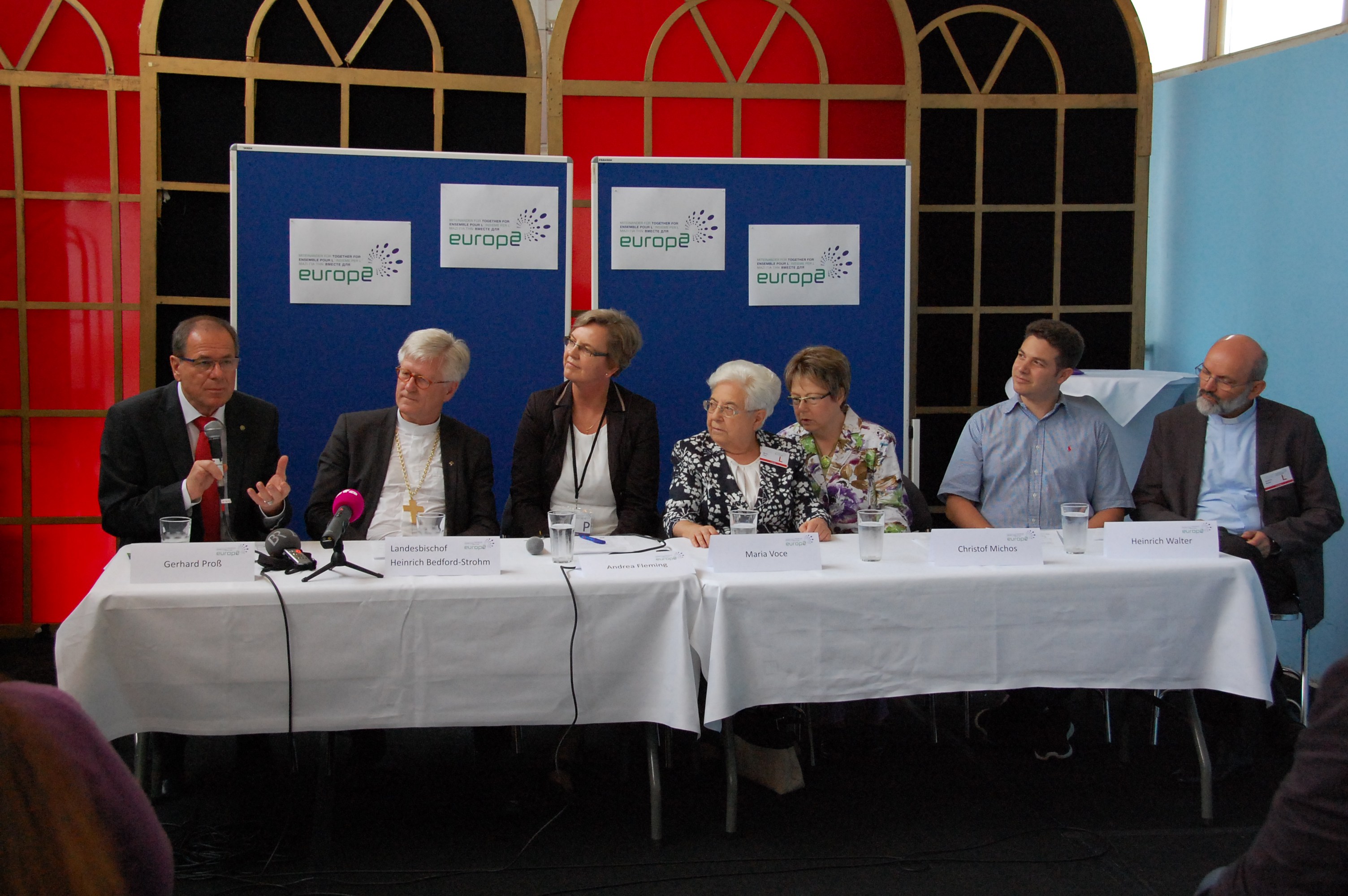
Press Conferenze, June, 30
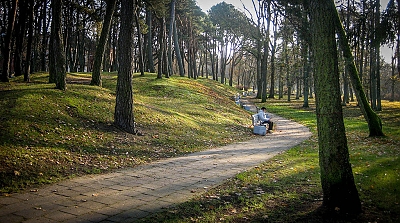
Jun 30, 2016 | Non categorizzato
 “Urged by the stances of our leaders – remember, for example, the establishment of the Day of Prayer for the Protection of Creation (Patriarch Demetrio, 1989), the Evangelical Climate Initiative (2006) and the encyclical Laudato Si’ (Pope Francis, 2015); In recognition of the debt that we, the people of ancient Christian tradition, have contracted with the poor of the Earth and future generations due to the pollution of the Biosphere, mainly caused by our irresponsible progress in the recent past centuries; Aware that the alarm for climate change may become an opportunity for a novel integral development of all people; We Christians, open to the contribution of all people regardless of their beliefs, commit ourselves in prayer and action to avoid the destruction of nature and a new world war, and endorse the following ten challenges:
“Urged by the stances of our leaders – remember, for example, the establishment of the Day of Prayer for the Protection of Creation (Patriarch Demetrio, 1989), the Evangelical Climate Initiative (2006) and the encyclical Laudato Si’ (Pope Francis, 2015); In recognition of the debt that we, the people of ancient Christian tradition, have contracted with the poor of the Earth and future generations due to the pollution of the Biosphere, mainly caused by our irresponsible progress in the recent past centuries; Aware that the alarm for climate change may become an opportunity for a novel integral development of all people; We Christians, open to the contribution of all people regardless of their beliefs, commit ourselves in prayer and action to avoid the destruction of nature and a new world war, and endorse the following ten challenges:
- To convert in projects of peace the weapons disseminated around us, especially the atomic ones
- To increase research in the Biosphere science and its applications, so that they can become safer
- To differentiate and recycle household and industrial waste
- To intensify the use of renewable energy sources
- To plan reforestation programs and forest policies at all levels (from local to international)
- To strengthen ecological transports, such as electric and hydrogen based cars, and local public transport initiatives
- To increasingly allocate hydrocarbons to the production of substances and materials useful for humanity rather than using them for burning
- To avoid the waste of precious common goods such as water and food, ensuring a more equitable distribution
- To respect other living beings, recognizing that everything is in relation in the planet
- To transform our homes, our neighbourhoods and cities into places of beauty, harmony and fraternity
How?
- Adhering to our leaders’ stances and promoting complying laws, such as the Paris Agreement
- Promoting initiatives in accordance with the “Golden Rule” and joining the initiatives of other people, regardless of their belief
- Asking for advice to our communities and cooperating with them in promoting actions to save nature and humanity
We can achieve these goals if we start now, before it is too late. In particular, we can help ensure that greenhouse gases do not exceed the safety levels, as foreseen by the Paris Agreement and recommended by the scientific community.” EcoOne (www.ecoone.org/) Civiltà dell’amore (www.civiltadellamore.org/)
Jun 29, 2016 | Focolare Worldwide
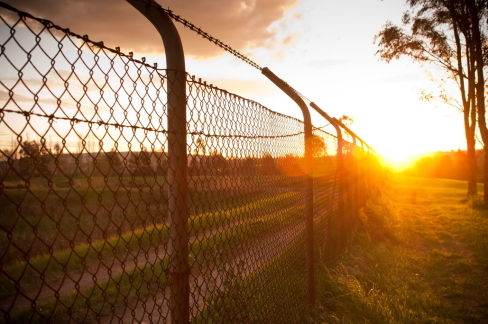
Jun 28, 2016 | Focolare Worldwide
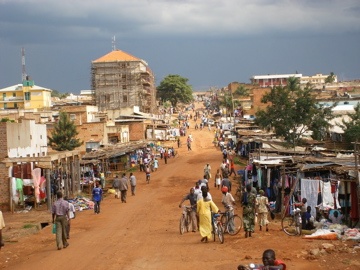 Gulu in northern Uganda is now the second largest city of the country. Many immigrants and Ugandans have moved there to school and find work. Among them is Gloria Mukambonera who works in the computer field. When she arrived in 2013, she contacted the local Focolare community so that she could share her Gospel ideal of peace and unity with others. “I found a real family here” she recounts, “in which I could share my joys and sorrows. We also practice a communion of goods, following the example of the first Chrisitan communities, each person in their own way. The proceeds are used to help people in need and to care for the sick members of the community.” It is an experience that helps you to see the needs of those around you, which are many because of the war. “One day,” says Gloria, “a priest had asked us to visit the people in a parish that was 4 hours away, because – he told us – there was a conflict between tribes and we might be able to help them reconcile. He had suggested that we tell them about how we try to live the Gospel and of our experiences of peace and unity that flow from that. In particular we shared our experiences of forgiveness, of how we were helped to overcome the divisions among us by living the ‘art of loving’ that is found in the Gospel. There was quite a special meeting with all the young people of the place. We read the Word of Life and shared with them our experiences of trying to live it, and then we invited them to share. There was singing, games and mini theatrical performances. . . The dialogue that followed uncovered their desire to begin living in reconciliation with one another.” It was an opportunity to be “peacebuilders” as the bishop had invited us to be. For us it was a matter of “choosing the Gospel’s way of love for the reconstruction of the country, following the destruction caused by years of war.”
Gulu in northern Uganda is now the second largest city of the country. Many immigrants and Ugandans have moved there to school and find work. Among them is Gloria Mukambonera who works in the computer field. When she arrived in 2013, she contacted the local Focolare community so that she could share her Gospel ideal of peace and unity with others. “I found a real family here” she recounts, “in which I could share my joys and sorrows. We also practice a communion of goods, following the example of the first Chrisitan communities, each person in their own way. The proceeds are used to help people in need and to care for the sick members of the community.” It is an experience that helps you to see the needs of those around you, which are many because of the war. “One day,” says Gloria, “a priest had asked us to visit the people in a parish that was 4 hours away, because – he told us – there was a conflict between tribes and we might be able to help them reconcile. He had suggested that we tell them about how we try to live the Gospel and of our experiences of peace and unity that flow from that. In particular we shared our experiences of forgiveness, of how we were helped to overcome the divisions among us by living the ‘art of loving’ that is found in the Gospel. There was quite a special meeting with all the young people of the place. We read the Word of Life and shared with them our experiences of trying to live it, and then we invited them to share. There was singing, games and mini theatrical performances. . . The dialogue that followed uncovered their desire to begin living in reconciliation with one another.” It was an opportunity to be “peacebuilders” as the bishop had invited us to be. For us it was a matter of “choosing the Gospel’s way of love for the reconstruction of the country, following the destruction caused by years of war.”  Ibanda lives in Uganda’s Western Region. There is also a Focolare group there, and they strive to transform the environment around them by transforming themselves, beginning from a jail. “Our outlook and behaviour have changed radically, especially the negative view we had of the inmates,” says Sara Matziko. “The Gospel sentence: “In everything do to others as you would have them do to you” (Mt 7:12) has encouraged us to visit them and pray with them. We discovered that many of them had not received the sacraments for years. The priest from our community went with us to offer this service.” The inmates’ relatives gradually overcame their indifference, we became friends and they went with us to visit the inmates. During one of those visits I met a young man named Ambrose who, after his jail time, wanted to continue his studies. “We helped him to finish high school,” Sara recounts. “Living the Word of Life with one another improved the relationship among us and within the community. The pastor has also joined us in this process that we try to share with other parish communities. Several people from our group attended the international Economy of Communion (EoC) meeting that was held in Kenya, at Mariapolis Piero, May 2015. That helped us to carry ahead our current project.”
Ibanda lives in Uganda’s Western Region. There is also a Focolare group there, and they strive to transform the environment around them by transforming themselves, beginning from a jail. “Our outlook and behaviour have changed radically, especially the negative view we had of the inmates,” says Sara Matziko. “The Gospel sentence: “In everything do to others as you would have them do to you” (Mt 7:12) has encouraged us to visit them and pray with them. We discovered that many of them had not received the sacraments for years. The priest from our community went with us to offer this service.” The inmates’ relatives gradually overcame their indifference, we became friends and they went with us to visit the inmates. During one of those visits I met a young man named Ambrose who, after his jail time, wanted to continue his studies. “We helped him to finish high school,” Sara recounts. “Living the Word of Life with one another improved the relationship among us and within the community. The pastor has also joined us in this process that we try to share with other parish communities. Several people from our group attended the international Economy of Communion (EoC) meeting that was held in Kenya, at Mariapolis Piero, May 2015. That helped us to carry ahead our current project.”
Jun 28, 2016 | Non categorizzato, Word of
World of Life audio mp3 Giving an amnesty to one another, forgiving one another totally and each day, we can grow in the kindness that mirrors God’s mercy to us. There is nothing more wonderful than hearing someone say to you: ‘I love you.’ When someone loves us we don’t feel alone, we walk secure, we are able also to face difficulties and critical situations. If then our being loved becomes mutual, hope and trust are reinforced, and we feel protected. We all know that children, to grow well, need to be surrounded by an environment that is full of love, and to have someone who loves them. But this is true at any age. For this reason the Word of Life invites us to be ‘kind’ to one another, which is to say to love one another, and it gives God himself as a model. It is precisely his example that reminds us that loving one another is not mere sentiment. It is an extremely concrete and demanding ‘desire for the good of the other’. In Jesus God has come close to the sick and the poor, has felt compassion for the crowds, has had mercy on sinners, and has forgiven those who crucified him. For us, too, wanting the good of others means listening to them, showing them sincere attention, sharing their joys and trials, taking care of them, walking with them along their way. The other person is never a stranger, but a brother or sister who belongs to me, who I wish to serve. The exact opposite of what happens when we see others as rivals, competitors, enemies, to the point of wanting their harm, to the point of crushing them, even eliminating them, as sadly we are told in the news happens day by day. Even though we may not go so far, don’t we also accumulate grudges, distrust, hostility or simple indifference towards persons who have hurt us or who we find unpleasant or who do not belong to our social circle? Wanting the good of one another, the Word of Life teaches us, means following the path of mercy, ready to forgive one another every time we slip up. Talking of this, Chiara Lubich tells us about the experience at the beginning of her new Christian community. In order to put Jesus’s command into practice, she and her first companions made a pact of mutual love. And yet, despite this, ‘especially in the early times it was not always easy for a group of girls to live the love radically. We were people like anyone else, even if we were sustained by a special gift of God and, among us, on our relationships, dust could gather and unity could weaken. This is what happened, for example, when we realized the shortcomings, the imperfections, of the others and we judged them, so that the current of mutual love grew cold. ‘In reaction to this situation one day we thought would make pact among us that we called the “pact of mercy”. We decided every morning to see each neighbour we met – in our focolare house, at school, at work and so on – as new, as really new, without remembering at all the other’s flaws, the other’s defects, but covering everything with love. It was a matter of meeting everyone with this complete amnesty in our hearts, with this universal pardon. It was a powerful commitment, taken by all of us together, that helped us always to be the first in loving in imitation of God who is merciful, who forgives and forgets.1 A pact of mercy! Could not this be a way of growing in kindness? Fabio Ciardi 1 Love of neighbour, Talk given to Muslim friends, Castel Gandolfo, 1 November 2002.
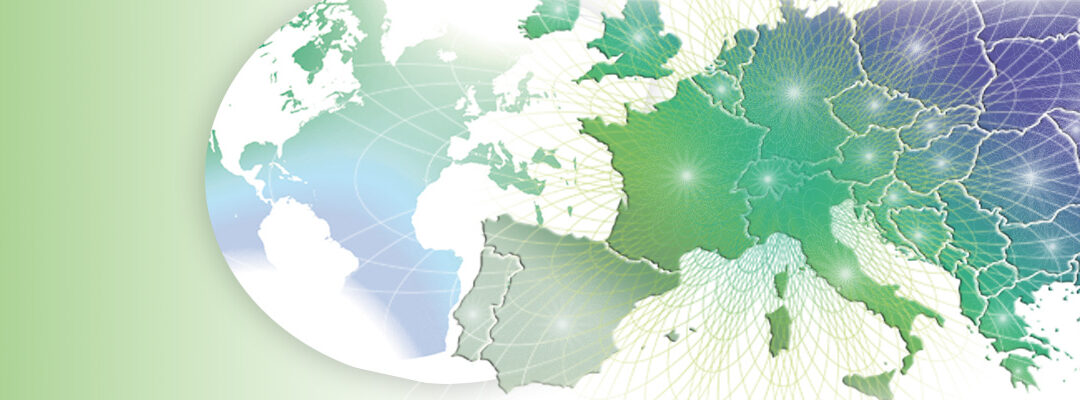
Jun 27, 2016 | Focolare Worldwide
 The outcome of the recent British referendum is one of the many symptoms of a fragmented Europe. It confirms that functional measures are not enough to convince about a common membership. This crisis calls for reflection and bold proposals. It is the right time for the Together for Europe edition, a clear, public manifestation of efforts for the renewal of the continent. It will take place in Munich from June 30 to July 2, 2016 Those familiar with Together for Europe know that this is not an event but a process towards unity in diversity that started in 1999. It involves a growing number of Movements and Communities – to date more than 300 – a confident minority, that comes from various Churches in different European countries. Through encounter and reconciliation, this process has produced its effects: communities and movements experience encounter and discover complementary; mutual trust brings change. Programme. On June 30 and July 1, 1500 leaders and collaborators will take part in a congress held at the Circus-Krone-Bau. Apart from plenary sessions, the programme consists of 36 forums and round tables. Cardinal Peter Turkson is expected to be one of the main participants. An outdoor rally, open to the public, will take place on July 2 at the central Karlsplatz (Stachus) in Munich. Olav Fykse Tveit, General Secretary of the World Council of Churches, the Catholic Cardinals Kurt Koch and Reinhard Marx, the Evangelical Bishops Frank Otfried July and Heinrich Bedford-Strohm, the Orthodox Metropolitan Serafim Joanta are among the main speakers representing the different Churches, while Maria Voce (Focolare Movement), Gerhard Pross (YMCA Esslingen), Andrea Riccardi (Sant’Egidio), Michelle Moran (ICCRS), Walter Heidenreich (FCJG Lüdenscheid) and P. Heinrich Walter (Schoenstatt Movement) will be the speakers that come from the Movements and Communities. Youth have been offering their active, convinced and creative contribution towards this programme. Pope Francis and the Ecumenical Patriarch Bartholomew I will be present through their video messages. The programme can be followed in 7 languages through a streaming broadcast (www.together4europe.org). Topics on the agenda include integration and reconciliation, solidarity with the weakest, sustainability and environment protection, Christians and Muslims in dialogue, marriage and family and economy. These are meant to stimulate a responsibility that goes beyond Europe, because the continent “has an experience of two thousand years of Christianity with ideas, culture, life and actions that can be offer as a service to today’s world, but unfortunately this has not been recognized yet” – Maria Voce says. Munich’s edition of Together for Europe is backed up by solid moments of reflection, discussions, sharing of views and experiences. Of significant importance is the conference entitled “Europe, what identity, what values”, organized by the World Council of Churches and the Focolare Movement. During this conference, held in Geneva on April 21 of this year, Pasquale Ferrara, a diplomat and a university professor claimed that today Europe needs to generate “fruits of Christianity”, rather than speak about its Christian roots. He also said that we need to present “the ‘golden rule’, which invites us to do to others what we would like others to do unto us” because such a rule “is not only of ethical value, but it also assumes a political dimension, as it makes one reflect about the nature and character of the political community”. Together for Europe seems capable to interpret this dimension while it inspires and motivates people of different generations and communities from countries across Europe to incarnate the values of justice, encounter, reconciliation and peace in their everyday life. Thus it contributes towards building “a Europe of leadership”, as described by Pope Francis when he visited the European Parliament in November 2014 and spoke of “a Europe which contemplates the heavens and pursues lofty ideals, which cares for, defends and protects every man and woman, which bestrides the earth surely and securely; a precious point of reference for all humanity”. The Munich event is under the patronage of UNESCO, the Council of Europe, the European Parliament and the European Commission. Source: Press Release – June 27, 2016
The outcome of the recent British referendum is one of the many symptoms of a fragmented Europe. It confirms that functional measures are not enough to convince about a common membership. This crisis calls for reflection and bold proposals. It is the right time for the Together for Europe edition, a clear, public manifestation of efforts for the renewal of the continent. It will take place in Munich from June 30 to July 2, 2016 Those familiar with Together for Europe know that this is not an event but a process towards unity in diversity that started in 1999. It involves a growing number of Movements and Communities – to date more than 300 – a confident minority, that comes from various Churches in different European countries. Through encounter and reconciliation, this process has produced its effects: communities and movements experience encounter and discover complementary; mutual trust brings change. Programme. On June 30 and July 1, 1500 leaders and collaborators will take part in a congress held at the Circus-Krone-Bau. Apart from plenary sessions, the programme consists of 36 forums and round tables. Cardinal Peter Turkson is expected to be one of the main participants. An outdoor rally, open to the public, will take place on July 2 at the central Karlsplatz (Stachus) in Munich. Olav Fykse Tveit, General Secretary of the World Council of Churches, the Catholic Cardinals Kurt Koch and Reinhard Marx, the Evangelical Bishops Frank Otfried July and Heinrich Bedford-Strohm, the Orthodox Metropolitan Serafim Joanta are among the main speakers representing the different Churches, while Maria Voce (Focolare Movement), Gerhard Pross (YMCA Esslingen), Andrea Riccardi (Sant’Egidio), Michelle Moran (ICCRS), Walter Heidenreich (FCJG Lüdenscheid) and P. Heinrich Walter (Schoenstatt Movement) will be the speakers that come from the Movements and Communities. Youth have been offering their active, convinced and creative contribution towards this programme. Pope Francis and the Ecumenical Patriarch Bartholomew I will be present through their video messages. The programme can be followed in 7 languages through a streaming broadcast (www.together4europe.org). Topics on the agenda include integration and reconciliation, solidarity with the weakest, sustainability and environment protection, Christians and Muslims in dialogue, marriage and family and economy. These are meant to stimulate a responsibility that goes beyond Europe, because the continent “has an experience of two thousand years of Christianity with ideas, culture, life and actions that can be offer as a service to today’s world, but unfortunately this has not been recognized yet” – Maria Voce says. Munich’s edition of Together for Europe is backed up by solid moments of reflection, discussions, sharing of views and experiences. Of significant importance is the conference entitled “Europe, what identity, what values”, organized by the World Council of Churches and the Focolare Movement. During this conference, held in Geneva on April 21 of this year, Pasquale Ferrara, a diplomat and a university professor claimed that today Europe needs to generate “fruits of Christianity”, rather than speak about its Christian roots. He also said that we need to present “the ‘golden rule’, which invites us to do to others what we would like others to do unto us” because such a rule “is not only of ethical value, but it also assumes a political dimension, as it makes one reflect about the nature and character of the political community”. Together for Europe seems capable to interpret this dimension while it inspires and motivates people of different generations and communities from countries across Europe to incarnate the values of justice, encounter, reconciliation and peace in their everyday life. Thus it contributes towards building “a Europe of leadership”, as described by Pope Francis when he visited the European Parliament in November 2014 and spoke of “a Europe which contemplates the heavens and pursues lofty ideals, which cares for, defends and protects every man and woman, which bestrides the earth surely and securely; a precious point of reference for all humanity”. The Munich event is under the patronage of UNESCO, the Council of Europe, the European Parliament and the European Commission. Source: Press Release – June 27, 2016
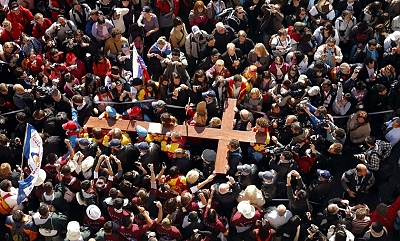
Jun 26, 2016 | Non categorizzato
 Jesus Forsaken Highest Expression of the Father’s Mercy Jesus Christ reveals the true face of God (see MV, 1), the image of the Father, his expression, his glory, his beauty, the beauty of his love (see Jn 14:8-9). By accomplishing the Pasqual Mystery, Jesus conquers suffering, sin and death, and transforms everything into mercy (see Rm 5:20). God became man to love,” Chiara Lubich says, “not only with Divine Love, but also with Suffering. He took upon Himself “all the sufferings of the world, all the disunity of the universe and made it all: Love, God!” Co vered in our sins, He renders the suffering, love; He translates misery into Mercy (misericordia).” In a letter from 1945 Chiara admits: “I also fall, often, always. But when I lift my gaze to Him and see Him there, incapable of revenge, since He is nailed to the cross because of His boundless love, I let myself be caressed by His Infinite Mercy and I know it’s the only thing that must win out in me. What good would it do Him to be infinitely Merciful? What good would it do Him if it were not for our sins?” And with abandon Chiara exclaims: “I would like to bear witness to the world that Jesus Forsaken has filled every void, enlightened every darkness, accompanied every loneliness, annulled every suffering and cancelled every sin.” These are a few cardinal points of Chiara Lubich’s in a nutshell seen from the standpoint of mercy which this Holy Year invites us to consider. We can’t end without a brief mention of Mary, Mother of Mercy and Mother of the Work founded by Chiara and named by her “Work of Mary”. Chiara writes: “A mother never stops loving the son when he’s bad, she never stops waiting for him if he’s far away, she never desires anything but to find him again, forgive him, take him into her arms – because a mother’s love is scented with mercy. (…) A mother’s love is by its very nature stronger than death. (…) Well, then, if this is what the love of ordinary mothers is like, imagine what the love of Mary is like, the human-Divine Mother of a boy who was God, and spiritual Mother us all ! (…) But God deposited his whole design for humanity in Mary (see Lk 1:49): In Mary he reveals all of his Mercy for humanity.” Source: Centro Chiara Lubich Part One: Mercy in the Spirituality of Chiara Lubich Part Two: Chiara Lubich: Love of Neighbour & the Works of Mercy Complete text by Alba Sgariglia (Italian)
Jesus Forsaken Highest Expression of the Father’s Mercy Jesus Christ reveals the true face of God (see MV, 1), the image of the Father, his expression, his glory, his beauty, the beauty of his love (see Jn 14:8-9). By accomplishing the Pasqual Mystery, Jesus conquers suffering, sin and death, and transforms everything into mercy (see Rm 5:20). God became man to love,” Chiara Lubich says, “not only with Divine Love, but also with Suffering. He took upon Himself “all the sufferings of the world, all the disunity of the universe and made it all: Love, God!” Co vered in our sins, He renders the suffering, love; He translates misery into Mercy (misericordia).” In a letter from 1945 Chiara admits: “I also fall, often, always. But when I lift my gaze to Him and see Him there, incapable of revenge, since He is nailed to the cross because of His boundless love, I let myself be caressed by His Infinite Mercy and I know it’s the only thing that must win out in me. What good would it do Him to be infinitely Merciful? What good would it do Him if it were not for our sins?” And with abandon Chiara exclaims: “I would like to bear witness to the world that Jesus Forsaken has filled every void, enlightened every darkness, accompanied every loneliness, annulled every suffering and cancelled every sin.” These are a few cardinal points of Chiara Lubich’s in a nutshell seen from the standpoint of mercy which this Holy Year invites us to consider. We can’t end without a brief mention of Mary, Mother of Mercy and Mother of the Work founded by Chiara and named by her “Work of Mary”. Chiara writes: “A mother never stops loving the son when he’s bad, she never stops waiting for him if he’s far away, she never desires anything but to find him again, forgive him, take him into her arms – because a mother’s love is scented with mercy. (…) A mother’s love is by its very nature stronger than death. (…) Well, then, if this is what the love of ordinary mothers is like, imagine what the love of Mary is like, the human-Divine Mother of a boy who was God, and spiritual Mother us all ! (…) But God deposited his whole design for humanity in Mary (see Lk 1:49): In Mary he reveals all of his Mercy for humanity.” Source: Centro Chiara Lubich Part One: Mercy in the Spirituality of Chiara Lubich Part Two: Chiara Lubich: Love of Neighbour & the Works of Mercy Complete text by Alba Sgariglia (Italian)
Jun 25, 2016 | Focolare Worldwide

Jun 24, 2016 | Focolare Worldwide
 “Here I learned how to dialogue with my children, and I shall surely return to know more,” remarked one of the mothers dressed in a sari. One of the fathers said, “I have decided to dedicate more time for my children.” The comments came from two of the 60 participants attending the course on parenting held at Udisha, which was entitled: “Children – the future of our nation”. After school, in the same facilities, their children are given a snack, toys and after-school activities. For some of the parents, the themes dealt with were a surprising novelty, while for others they were eye-openers to their own mistakes and the dangers and risks to which their children are exposed. But the course was not the only a promotion addressing the parents.
“Here I learned how to dialogue with my children, and I shall surely return to know more,” remarked one of the mothers dressed in a sari. One of the fathers said, “I have decided to dedicate more time for my children.” The comments came from two of the 60 participants attending the course on parenting held at Udisha, which was entitled: “Children – the future of our nation”. After school, in the same facilities, their children are given a snack, toys and after-school activities. For some of the parents, the themes dealt with were a surprising novelty, while for others they were eye-openers to their own mistakes and the dangers and risks to which their children are exposed. But the course was not the only a promotion addressing the parents. 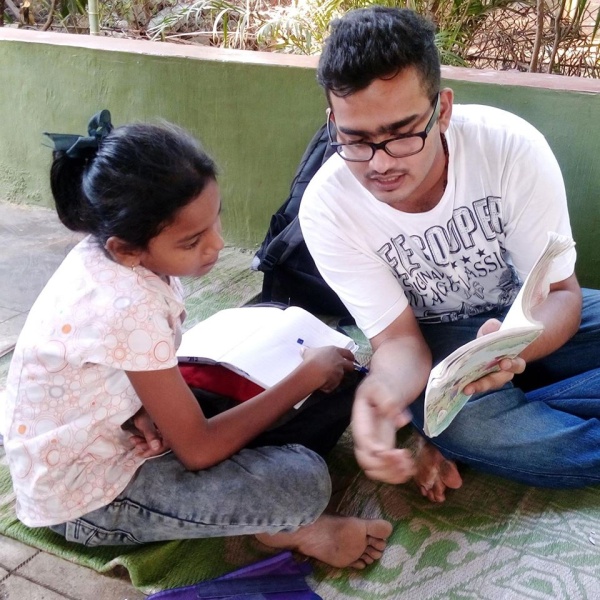 In this 5th year of Udisha – one of the social projects of the Focolare for disadvantaged children, teens and families – there is also the opportunity to obtain a microcredit, thanks to which the economy of many families has decisively improved. Especially the women have gained access to an initial subsidy and many have been able to open small handicraft or business activities such as the production of crochet bags or selling cooked food. Already 52 mothers hold monthly group meetings to share their entrepreneurial experiences and solve some common problems together. Other successful activities this year was the prophylaxis against typhus, which was beneficial to 107 children and adults, and 72 adults and 95 kids were vaccinated against German measles. But the greatest efforts of the project addressed the kids who were involved in new activities. Independence Day on 15 August was celebrated with the flag-raising ceremony, accompanied by patriotic songs and poems. In September instead, on the occasion of the Bandra fair – one of the city’s most important events – children and parents had a field trip to the Mount Mary Basilica. Also in September, India celebrated teachers’ day and the children once again thanked their educators with a song, dance and theater performance.
In this 5th year of Udisha – one of the social projects of the Focolare for disadvantaged children, teens and families – there is also the opportunity to obtain a microcredit, thanks to which the economy of many families has decisively improved. Especially the women have gained access to an initial subsidy and many have been able to open small handicraft or business activities such as the production of crochet bags or selling cooked food. Already 52 mothers hold monthly group meetings to share their entrepreneurial experiences and solve some common problems together. Other successful activities this year was the prophylaxis against typhus, which was beneficial to 107 children and adults, and 72 adults and 95 kids were vaccinated against German measles. But the greatest efforts of the project addressed the kids who were involved in new activities. Independence Day on 15 August was celebrated with the flag-raising ceremony, accompanied by patriotic songs and poems. In September instead, on the occasion of the Bandra fair – one of the city’s most important events – children and parents had a field trip to the Mount Mary Basilica. Also in September, India celebrated teachers’ day and the children once again thanked their educators with a song, dance and theater performance.  On 2 October, feast of the father of the nation – Mahatma Gandhi – the celebration started with the thoughts of Gandhi on nonviolence and peace, and reflections on the poverty of many children living on the streets and the importance of sharing. Despite their extreme poverty, also the Udisha children wanted to share the little they had: some clothing item, a small toy, or some sweets. And discussing among themselves, they also listed many other things to share: their ideas, joy, and smiles. The Diwali (Feast of Light) is India’s most important feast that takes place for four days between October and November every year – during which the children of Udisha used all their creativity in painting terracotta vases and drawing pictures with coloured powder. It was their way of contributing to the project, mostly through a distance-financing from a nonprofit AFN organization. The intensity with which the children of Udisha absorb the “culture of giving” is really impressive. This inspiring idea is the core of the project and education they receive, and a value that is conveyed to them not only through words but through the concrete love of the volunteers onsite, and those across the ocean, whom they have never met but who care for them.
On 2 October, feast of the father of the nation – Mahatma Gandhi – the celebration started with the thoughts of Gandhi on nonviolence and peace, and reflections on the poverty of many children living on the streets and the importance of sharing. Despite their extreme poverty, also the Udisha children wanted to share the little they had: some clothing item, a small toy, or some sweets. And discussing among themselves, they also listed many other things to share: their ideas, joy, and smiles. The Diwali (Feast of Light) is India’s most important feast that takes place for four days between October and November every year – during which the children of Udisha used all their creativity in painting terracotta vases and drawing pictures with coloured powder. It was their way of contributing to the project, mostly through a distance-financing from a nonprofit AFN organization. The intensity with which the children of Udisha absorb the “culture of giving” is really impressive. This inspiring idea is the core of the project and education they receive, and a value that is conveyed to them not only through words but through the concrete love of the volunteers onsite, and those across the ocean, whom they have never met but who care for them.

 «It is paradoxical that the new Europe, which arose out of the demolition of the Berlin Wall, should be tempted, through fear, to shut itself behind new fences, building new walls and fences, in the illusion of being able to stop history that is once again knocking at its doors. The single currency project was supposed to be a big new step towards political union, a great new identifying moment in which solidarity and the sharing of sovereignty, in order to achieve common objectives, were to represent the fundamental pillars. Actually two examples show us how little this has been achieved. On the one hand, the serious delays and heated debates that followed the Greek debt crisis, which greatly undermined the foundations of solidarity among the member states, even leading to speculation on Greece leaving the Euro. On the other hand there is the Brexit issue and other separatist tendencies which also test solidarity severely. Because going out of the Union is not like leaving a club, but is equivalent to, and much more like, abandoning partners with whom we no longer share the same reason for being together: the founding pact. Europe is going through the dark night of its own principles, the dark night of its dreams. In reality, a great sense of disorientation reigns in our continent because of the presence of three simultaneous crises: an unprecedented migratory crisis, together with a deep economic crisis, against the backdrop of a demographic crisis. While leaving it to others to analyse the reasons for these crises, I believe that the deeper causes of Europe’s weakness today can be found in the denial of God and of the transcendent. This is a result of the gradual emergence and spread of secular culture which wants to do away with any link with the supernatural. In the search for total freedom, Europe no longer recognizes that its culture was formed through 2,000 years of Christian tradition. Denying this means cutting its own roots and finding itself like a lifeless tree. So is everything collapsing then? Is the continent’s dream of unity being shattered? No. We are here together, as Christian movements and communities in Europe, because we believe there is something that does not collapse. It is love; God who is Love. Our movements are bearers of charisms which are certainly very different from each other and yet all are the work of the Holy Spirit. But the Holy Spirit is precisely the one who creates fraternity (so to speak) among the Persons of the Trinity and who unites all Christians. So the idea of fraternity originates in Heaven and is the purpose of life on earth. All of us can bear witness that we met Christ one day and let ourselves be fascinated and drawn into his Gospel. Living his words led us to change ourselves and reach out to others, building relationships of gospel love and thereby creating communities that become leaven wherever they are. We have discovered a new willingness to be open to all, crossing the boundaries between Churches, between religions, between ethnicities and cultures, in a 360-degree dialogue, until we rediscover everyone as our brothers and sisters. In this way we have found the root of our European culture once more and, on this foundation, we have tried to interpret our present times, which concern the entire planet and all humankind as never before, from the perspective of moving towards a united world. In fact, applying the ideals of peace, justice, freedom and equality today means having a universal dimension, which fraternity makes possible (read the full text)».
«It is paradoxical that the new Europe, which arose out of the demolition of the Berlin Wall, should be tempted, through fear, to shut itself behind new fences, building new walls and fences, in the illusion of being able to stop history that is once again knocking at its doors. The single currency project was supposed to be a big new step towards political union, a great new identifying moment in which solidarity and the sharing of sovereignty, in order to achieve common objectives, were to represent the fundamental pillars. Actually two examples show us how little this has been achieved. On the one hand, the serious delays and heated debates that followed the Greek debt crisis, which greatly undermined the foundations of solidarity among the member states, even leading to speculation on Greece leaving the Euro. On the other hand there is the Brexit issue and other separatist tendencies which also test solidarity severely. Because going out of the Union is not like leaving a club, but is equivalent to, and much more like, abandoning partners with whom we no longer share the same reason for being together: the founding pact. Europe is going through the dark night of its own principles, the dark night of its dreams. In reality, a great sense of disorientation reigns in our continent because of the presence of three simultaneous crises: an unprecedented migratory crisis, together with a deep economic crisis, against the backdrop of a demographic crisis. While leaving it to others to analyse the reasons for these crises, I believe that the deeper causes of Europe’s weakness today can be found in the denial of God and of the transcendent. This is a result of the gradual emergence and spread of secular culture which wants to do away with any link with the supernatural. In the search for total freedom, Europe no longer recognizes that its culture was formed through 2,000 years of Christian tradition. Denying this means cutting its own roots and finding itself like a lifeless tree. So is everything collapsing then? Is the continent’s dream of unity being shattered? No. We are here together, as Christian movements and communities in Europe, because we believe there is something that does not collapse. It is love; God who is Love. Our movements are bearers of charisms which are certainly very different from each other and yet all are the work of the Holy Spirit. But the Holy Spirit is precisely the one who creates fraternity (so to speak) among the Persons of the Trinity and who unites all Christians. So the idea of fraternity originates in Heaven and is the purpose of life on earth. All of us can bear witness that we met Christ one day and let ourselves be fascinated and drawn into his Gospel. Living his words led us to change ourselves and reach out to others, building relationships of gospel love and thereby creating communities that become leaven wherever they are. We have discovered a new willingness to be open to all, crossing the boundaries between Churches, between religions, between ethnicities and cultures, in a 360-degree dialogue, until we rediscover everyone as our brothers and sisters. In this way we have found the root of our European culture once more and, on this foundation, we have tried to interpret our present times, which concern the entire planet and all humankind as never before, from the perspective of moving towards a united world. In fact, applying the ideals of peace, justice, freedom and equality today means having a universal dimension, which fraternity makes possible (read the full text)».





 Gulu in northern Uganda is now the second largest city of the country. Many immigrants and Ugandans have moved there to school and find work. Among them is Gloria Mukambonera who works in the computer field. When she arrived in 2013, she contacted the local Focolare community so that she could share her Gospel ideal of peace and unity with others. “I found a real family here” she recounts, “in which I could share my joys and sorrows. We also practice a communion of goods, following the example of the first Chrisitan communities, each person in their own way. The proceeds are used to help people in need and to care for the sick members of the community.” It is an experience that helps you to see the needs of those around you, which are many because of the war. “One day,” says Gloria, “a priest had asked us to visit the people in a parish that was 4 hours away, because – he told us – there was a conflict between tribes and we might be able to help them reconcile. He had suggested that we tell them about how we try to live the Gospel and of our experiences of peace and unity that flow from that. In particular we shared our experiences of forgiveness, of how we were helped to overcome the divisions among us by living the ‘art of loving’ that is found in the Gospel. There was quite a special meeting with all the young people of the place. We read the Word of Life and shared with them our experiences of trying to live it, and then we invited them to share. There was singing, games and mini theatrical performances. . . The dialogue that followed uncovered their desire to begin living in reconciliation with one another.” It was an opportunity to be “peacebuilders” as the bishop had invited us to be. For us it was a matter of “choosing the Gospel’s way of love for the reconstruction of the country, following the destruction caused by years of war.”
Gulu in northern Uganda is now the second largest city of the country. Many immigrants and Ugandans have moved there to school and find work. Among them is Gloria Mukambonera who works in the computer field. When she arrived in 2013, she contacted the local Focolare community so that she could share her Gospel ideal of peace and unity with others. “I found a real family here” she recounts, “in which I could share my joys and sorrows. We also practice a communion of goods, following the example of the first Chrisitan communities, each person in their own way. The proceeds are used to help people in need and to care for the sick members of the community.” It is an experience that helps you to see the needs of those around you, which are many because of the war. “One day,” says Gloria, “a priest had asked us to visit the people in a parish that was 4 hours away, because – he told us – there was a conflict between tribes and we might be able to help them reconcile. He had suggested that we tell them about how we try to live the Gospel and of our experiences of peace and unity that flow from that. In particular we shared our experiences of forgiveness, of how we were helped to overcome the divisions among us by living the ‘art of loving’ that is found in the Gospel. There was quite a special meeting with all the young people of the place. We read the Word of Life and shared with them our experiences of trying to live it, and then we invited them to share. There was singing, games and mini theatrical performances. . . The dialogue that followed uncovered their desire to begin living in reconciliation with one another.” It was an opportunity to be “peacebuilders” as the bishop had invited us to be. For us it was a matter of “choosing the Gospel’s way of love for the reconstruction of the country, following the destruction caused by years of war.” 




